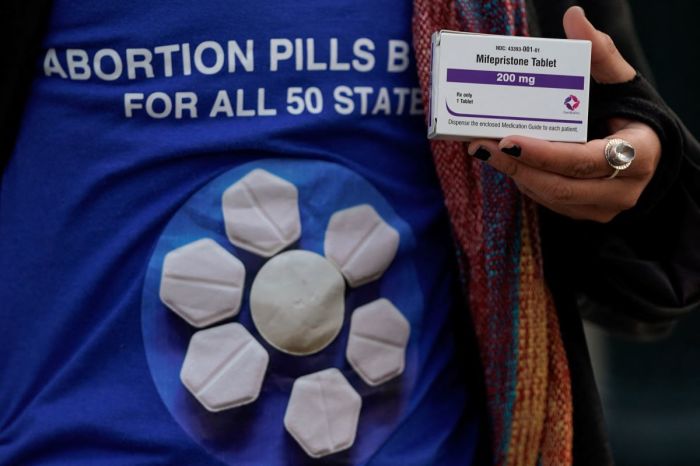
A pro-life group has released a peer-reviewed report pushing back against what it calls a "baseless" claim that abortion drugs are just as safe as common pain-relief drugs like Tylenol.
The Charlotte Lozier Institute, the research arm of the pro-life advocacy group Susan B. Anthony Pro-Life America, published a report in BioTech earlier this week refuting assertions that the abortion pill mifepristone is safer than Tylenol.
In a statement coinciding with the report's release, report author and CLI Director of Life Sciences Carmen Loutit noted that "the abortion lobby's claim that abortion drugs are 'safer than Tylenol' has dominated public discussion, propelled by the illusion of scientific consensus."
"However, no such support exists," she added. "This baseless claim, repeated by medical societies, politicians, media pundits and researchers, has profoundly influenced public opinion and policy. But, as this paper details, those spreading it lack the evidence they routinely claim."
Loutit cited an assertion made by Connecticut's Democratic Attorney General William Tong, who was one of 18 attorneys general filing a lawsuit over the Food and Drug Administration's restrictions on the distribution of mifepristone.
"Mifepristone is safer than Tylenol. We have more than 20 years of clear and conclusive scientific evidence proving that. We're asking the judge now to cut to the chase — to strike the needless political red tape and order new rules based on science and safety," Tong said in an October 2024 statement.
Planned Parenthood, the nation's largest abortion provider, actively promotes the claim on its website that "medication abortion is very safe."
"In fact, it's safer than many other medicines like penicillin, Tylenol, and Viagra," the website reads. "Serious problems are rare, but like all medicines, there can be risks."
When examining the origin of the claim, the CLI report points to a 2003 Chicago Tribune article detailing the death of a teenager after taking mifepristone.
"Dr. David Grimes, an abortion provider and past chief of the U.S. Centers for Disease Control and Prevention (CDC) abortion surveillance branch, was asked for comment," Loutit summarized. "Against the CDC's then-current figure of slightly less than one per 100,000 deaths in those seeking abortion, he juxtaposed an uncited two per 100,000 death rate associated with penicillin and concluded that 'having an abortion this way is safer than that.'"
"Comparisons to sildenafil and acetaminophen soon followed in a 2004 editorial in the journal Contraception," he continued. "There, authors from the Association of Reproductive Health Professionals and the University of California, San Francisco (UCSF) wrote that '…mifepristone is safer than Viagra', again citing death rates, and that 'acetaminophen (Tylenol) causes more deaths each year.'"
The FDA's advertising guidelines have described any assertion that one drug is safer than another as "false, lacking in fair balance, or otherwise misleading" if "it has not been demonstrated to be safer or more effective in such particular by substantial evidence or substantial clinical experience."
"It is essential to state unequivocally that there has never been a single study appropriately comparing the safety of mifepristone and [Tylenol] or any of the common drugs presented in these claims, let alone a 20-year history of 'clear and conclusive scientific evidence' to this end," Loutit wrote. "Indeed, given that such a study would require similar indications for use, it is not possible for one to be undertaken."
"This alone is sufficient reason to qualify such comparisons as false and/or misleading and to contest their use to influence public and individual decision-making."
Loutit argues that "using death counts or death rates from different studies, at different times, and in vastly different populations, they asserted a reductionist definition of safety and compared numbers that are entirely incomparable."
Mifepristone has found itself in front of the U.S. Supreme Court in the past year. It characterized assurances of mifepristone's safety by comparing its death rates to those of other drugs as ineffective.
CLI cites a more recent study examining 1,596 survey respondents' reported pain experiences after taking mifepristone, which found that on a scale of one to 10, 41.5% of those surveyed described their pain as at least an eight, while 30.4% characterized it as "a lot more than expected."
"[B]ecause these side effects are known results of the drug's mechanism of action, such experiences are dismissed despite both their severity and the possibility that they may mask an emergent condition," the report concluded.
The CLI report is not the only work published by a conservative advocacy organization in recent weeks, raising concerns about the safety of the abortion pill.
Last month, the Ethics and Public Policy Center published a study finding that more than 10% of women who take the abortion pill experience adverse effects.